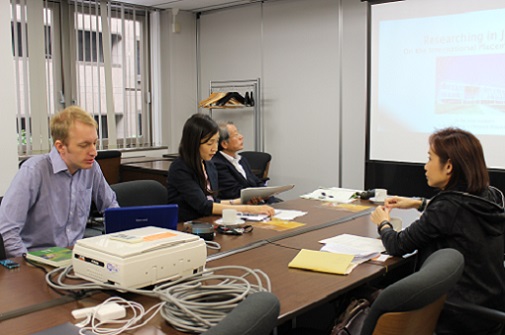Arts and Humanities Research Council International Placement Scheme alumni gathered in Tokyo

The depictions of Tokyo in a film, urban shrines, art festivals and modern Japanese poetry were the topics discussed at the second AHRC (Arts and Humanities Research Council) IPS (International Placement Scheme) alumni gathering at the National Institute for the Humanities on the afternoon of Monday, September 3, 2018.
Simone Shu-Yeng Chung, assistant professor of the National University of Singapore’s Department of Architecture among other topics presented part of her PhD work where she retraced the steps of Tokyo, as depicted in the Japanese film Café Lumière (2003). The film is an urban travelogue of Tokyo, directed by Taiwanese film director Hou Hsiao-hsien. Chung was inspired by Japanese architect Kon Wajirō’s hand-drawn sketches in Seikatsu-gaku: Kon Wajirō Collection Volume 5 (1971) that visualize how space, such as the kitchen of a Japanese farmer’s house, is used over time by the people occupying that space.
In her thesis, she managed to reconstruct the protagonist’s apartment room by just analyzing the film and the city image of Tokyo from the protagonist’s commute and travel on trains. Interestingly, the city image was centered around the Yamanote line, as most travelers to Tokyo become acquainted with the city through the Yamanote line.
Andrew Houwen, associate professor of Tokyo Woman’s Christian University’s Department of English, talked about his experience in Japan as a PhD student. The three-month visit brought about an artistic and creative aspect to his research activities. As part of his PhD thesis, Houwen examined the modern reception of Japanese poetry and during his visit, he came across many collections of and secondary literature on the post-war Japanese poet Naka Tarō. He also met Chikako Nihei, assistant professor of Yamaguchi University’s Faculty of Global and Science Studies, with whom he now closely collaborates. The two quickly got together to start a project – the translation of Naka’s poems into English – and continued to work on it after Houwen went back to the UK to finish his PhD. After almost 5 years, Houwen and Nihei have been able to produce a book out of their project this July: Music (Isobar Press, 2018), is a selection of their English translations of Naka’s poems.
The speakers and participants had good discussions on topics such as how the popularity of destinations like Naoshima, an island in the Setouchi Sea, differs between domestic and international tourists as well as the discrepancy in visibility of internationally renowned architects, and about “traditional” Japanese-style weddings that actually do not have a long history and how the style formalized in the way we see it today around the Meiji period.
Every year, since 2009, the NIHU institutes have invited PhD students or early-career researchers in UK universities and organizations to do research for a period of 3 to 6 months as part of the collaboration between the NIHU and the AHRC in the UK. Over 25 academics have used this scheme to visit Japan to collect data, find materials, do fieldwork and more. The AHRC IPS alumni gathering tries to connect the previous IPS fellows to create a network of scholars interested in Japan studies and exchange information on doing research in Japan. The first AHRC IPS alumni gathering was held in February 2018.

